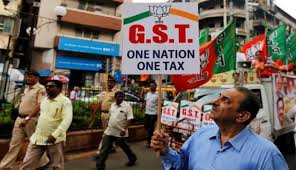India readies for new ‘tryst with destiny’ in GST

NEW DELHI (Reuters) – Prime minister, his cabinet colleagues and major company executives will gather on Friday in parliament’s central hall for the first midnight ceremony there in two decades to launch the most sweeping tax reform for nearly 70 years.
After 14 years of struggle to enlist the support of India’s states, the Goods and Services Tax (GST) will replace more than a dozen union and state levies and unify a country of 1.3 billion people into one of the world’s biggest common markets.
The measure is expected to make doing business easier by simplifying the tax structure and ensuring greater compliance, burnishing Prime Minister Narendra Modi’s credentials as a reformer before a planned re-election bid in 2019.
But many businesses were nervous about how the change will unfold while smaller establishments staged strikes saying they would get hit by higher tax rates.
Modi will mark the switch to the new tax regime with a speech in the central hall of parliament where India declared itself a free nation and first prime minister Jawaharlal Nehru made his famous “tryst with destiny” speech on Aug. 15, 1947.
“We are ready,” Revenue Secretary Hasmukh Adhia said, hours before the new measure comes into effect.
Ratan Tata, patriarch of India’s largest business group, Bollywood superstar Amitabh Bachchan and the country’s most famous singer Lata Mangeshkar will attend the ceremony.
“(It) will truly enable us to build a New India,” Jayant Sinha, a federal minister wrote in the Times of India.
The new sales tax has four rates and numerous exemptions. Adding to the complexity, businesses with a pan-India operation face an arduous task of filing over 1000 digital returns a year.
Protests, Strike
While higher tax rates for services and non-food items are expected to fuel price pressures, compliance is feared to be a major challenge in a country where many entrepreneurs are not computer literate and rely on hand-written ledgers.
“We have jumped into a river but don’t know its depth,” said A. Subba Rao, an executive director at power firm CLP India.
Poor implementation could deal a blow to Asia’s third-largest economy that is still recovering from Modi’s decision late last year to outlaw 86 percent of the currency in circulation.
The government expects things to settle down in the coming months, helping businesses reap the benefits of the new sales tax.
An end of tax arbitrage under the GST is estimated to save companies $ 14 billion in reduced logistics costs and efficiency gains.
As the GST is a value added tax, firms will have an incentive to comply in order to avail credit for taxes already paid. This should widen the tax net, shoring up public finances.
HSBC estimates the reform could add 0.4 percentage points to economic growth.
“(The) GST paves the way for the ‘One Nation, One Tax’ ideology,” said Devendra Kumar Vyas, chief executive officer at Srei Equipment Finance Ltd.
Editing by Sanjeev Miglani and Toby Davis



